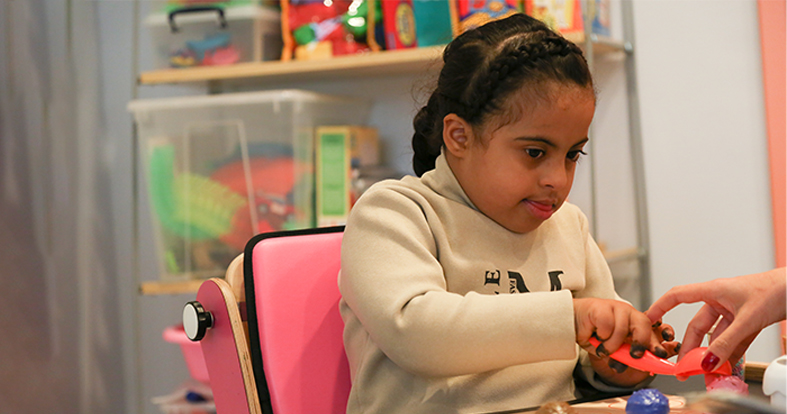

Challenging Behaviors in Children with Down syndrome: An Overview for Parents

Viviane Cappellari
DHA License Number: 00082911-001
Head of Speech & Language Department
MS, SLP

As a parent, it can be difficult to understand and manage challenging behaviors in children with Down syndrome. As this is a common concern for many families, it is important to know that with the right support and intervention, these behaviors can be reduced and managed effectively.
In general, children with Down Syndrome are known for being very sociable and affectionate. Despite having communication disabilities (which can vary from mild language and speech delay to more complex disorders such as childhood apraxia of speech or stuttering), they tend to be very interactive and eager to express themselves. They are also very intense in expressing their love towards their family members and friends, and they enjoy being active members of the community. When they become teenagers, they often participate in activities with groups related to arts, dance, and sports. During adulthood, they are the ones to present higher numbers in adapting into work placement programs in comparison to other individuals with special needs.
Down syndrome is a genetic condition that causes intellectual and physical disabilities. Children with Down syndrome can experience a wide range of challenging behaviors, including difficulties in communication, attention and focus, impulsiveness, and anxiety. These behaviors can be particularly challenging for parents and caregivers, and can impact the child’s quality of life, relationships with others as well as overall development.
Latest research reinforces that children with Down syndrome are at a higher risk of engaging in challenging behaviors which are often observed not only at home, but also in educational and social settings where the demands are higher. Studies show that there are many factors which can contribute to the occurrence of challenging behaviors in the Down syndrome population due to their phenotype and higher incidence of illnesses such as heart defects, hypothyroidism, lower immunity, respiratory and sleeping disorders, digestive problems, visual problems, hearing loss, auditory processing issues, reduced attention span, speech and language delay, stuttering, childhood apraxia of speech, etc.
Considering all heath issues mentioned, it is clear that, in general, individuals with Down syndrome are constantly struggling in managing their feelings. They must be very determined in overcoming their difficulties and keeping themselves motivated to cope in daily activities. Being aware of that, those surrounding them can try to help by implementing simple strategies to enhance communication skills and consequently reducing challenging behaviors. Parents and caregivers can do that with the right support and strategies, helping their children manage their challenging behaviors and improve their overall quality of life. In this article, we will discuss some of the most common challenging behaviors in children with Down syndrome and provide practical strategies for managing these behaviors.
Communication difficulties
One of the most common challenging behaviors in children with Down syndrome is difficulty with communication. They often have difficulty in expressing their needs and wants, which can lead to frustration and behavior issues. They may also have trouble understanding what others are saying which can further exacerbate the problem.
There are a variety of strategies that parents can use to help children with Down syndrome improve their communication skills. For example, they can use visual aids, such as picture cards or sign language, to help the child communicate their needs. They can also use positive reinforcement, such as praise and rewards, to encourage the child to communicate effectively. Additionally, parents can work with speech therapists to help the child improve their language skills and develop new communication strategies.
Attention and focus difficulties
Another common challenging behavior in children with Down syndrome is difficulty with attention and focus. They may have trouble staying focused on a task or following instructions, which can lead to frustration and behavior issues.
To help children with Down syndrome improve their attention and focus, parents can use a variety of strategies. For example, tasks could be broken down into smaller and more manageable steps. Parents could also provide frequent positive reinforcement to encourage the child stay focused. They can also use visual aids, such as pictures or diagrams, to help the child understand what they are being asked to do. Additionally, parents can work with occupational therapists to help the child develop better focus and attention skills.
Impulsiveness
Impulsiveness is another common challenging behavior in children with Down syndrome as they may act without thinking, which can lead to behavior issues and difficulties in social interactions.
To help children with Down syndrome manage their impulsiveness, parents can use a variety of strategies. For example, they can use positive reinforcement, such as praise and rewards, to encourage the child to think before acting. They can also use redirection and distraction techniques to help the child avoid impulsive behaviors. Additionally, parents can work with behavior therapists to help the child learn more appropriate ways of expressing their needs and wants.
Anxiety
Anxiety is another common challenging behavior in children with Down syndrome. Children with Down syndrome may experience anxiety due to their difficulties in communication and understanding the world around them.
To help children with Down syndrome manage their anxiety, parents can use a variety of strategies. For example, they can use deep breathing exercises and other relaxation techniques to help the child calm down when feeling anxious. Parents can also use positive reinforcement, such as praise and rewards, to encourage the child to manage anxiety in more appropriate ways. Additionally, parents can work with therapists to help the child develop better coping skills and reduce their overall anxiety.
To sum up, challenging behaviors in children with Down syndrome can be difficult for parents to manage, but with the right support and strategies, they can be reduced and managed effectively. Communication difficulties, attention and focus difficulties, impulsiveness, and anxiety are some of the most common challenging behaviors in children with Down syndrome.
It is important for parents to remember that every child with Down syndrome is unique, and their behaviors may vary based on their individual needs and circumstances. However, by using positive reinforcement, visual aids, and working with therapists, parents can help their children improve their communication skills, focus and attention, impulse control, and anxiety management.
If you are facing difficulties in dealing with your child’s behavior, try to observe and identify when the behavior and approach described above is applicable. It is also essential for parents to seek out support from healthcare professionals and therapists. With the right support, children with Down syndrome can lead happy and fulfilling lives, and their challenging behaviors can be managed effectively. By working together, parents and professionals can help the children reach their full potential and live the best life possible.
Please feel free to contact our therapists and discuss your concerns and challenges in dealing with your child.


